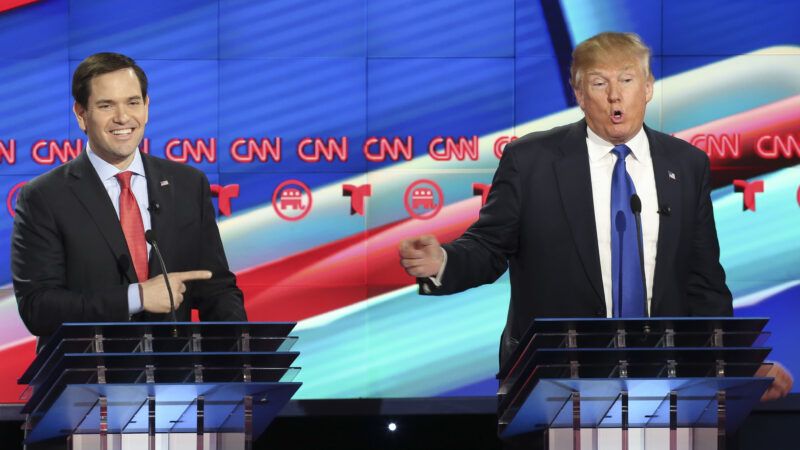Marco Rubio Used To Know How Tariffs Work. What Happened?
The economics of tariffs have not changed in the past eight years. Marco Rubio has.

At a Republican presidential primary debate in January 2016, Sen. Marco Rubio (R–Fla.) succinctly explained why using tariffs as a foreign policy tool would backfire against Americans.
"We are all frustrated with what China is doing, but I think we need to be very careful with tariffs and here's why," Rubio said, directly challenging Donald Trump over his call for placing tariffs on goods imported from China.
"China doesn't pay the tariff. The buyer pays the tariff," Rubio explained. "If you send a tie or a shirt made in China into the United States, and an American goes to buy it in the store, and there is a tariff on it, [the tariff] gets passed on in the price to the consumer."
In an essay published this week at The American Conservative, Rubio argued for exactly the opposite. Trump's plan to place even more tariffs on China if elected to another term in the White House would be "good for the economy insofar as they counteract market inefficiencies created by adversarial trade practices," Rubio writes, adding that it will "prevent or reverse offshoring, preserving America's economic might and promoting domestic investment."
The economics of tariffs have not changed in the past eight years. Rubio has.
The once-independent-minded senator from Florida has recently gone all-in on nationalist economics—presumably in an attempt to flatter Trump, a man Rubio once called a "dangerous con man." The senator has authored other essays recently advocating for industrial policy (he supports the "right" kind of industrial policy, which would of course be very different from the wrong kind of industrial policy President Joe Biden is pursuing, even though it's unclear how they would actually differ) and has publicly pushed back at critics who have called out his economic fallacies.
But the current version of Rubio is bound to lose this debate with his 2016 alter ego, who has the facts firmly on his side.
Indeed, just as Rubio predicted in 2016, the tariffs imposed by former President Donald Trump have been overwhelmingly paid by American businesses and consumers. Those groups "bore nearly the full cost of these tariffs because import prices increased at the same rate as the tariffs," the U.S. International Trade Commission (ITC) found in its five-year review of Trump's tariff policies. While Trump's tariffs on steel and aluminum spurred a small increase in domestic production of those metals, the ITC found, the downstream costs of the tariffs swamped the modest benefits.
Other studies found similar results. Here's one authored by economists at the Federal Reserve, Princeton University, and Columbia University that found Trump's tariffs cost U.S. consumers $3 billion per month. Here's a study by economists at the University of Chicago that found Trump's tariffs on washing machines hiked consumer costs by more than $1.5 billion. A study from Moody's Investor Service that found American consumers paid roughly 93 percent of the tariff costs. Other studies have come to similar conclusions.
In his American Conservative essay, Rubio tellingly doesn't attempt to offer evidence to contradict these well-established facts. Instead, he flippantly declares that the "'experts' got it wrong" and adds that "economists simplistically declare 'The policy is very bad. Tariffs make consumers poorer. They shrink the economy.'"
Perhaps the economists say those things because they are true and because the past six years have confirmed as much. It's fine to be skeptical of experts, but Rubio is the one making simplistic declarations here.
And if tariffs were the solution to anything, wouldn't there be evidence to support that claim by now? Rubio is engaging in a rhetorical trick more commonly used by progressives by suggesting that the lack of evidence in favor of a government policy isn't indicative of failure but only means that it hasn't been tried hard enough. Conservatives used to roll their eyes at that tactic.
Perhaps Rubio will parlay all these mental gymnastics and pro-Trump sycophancy into a vice presidential nomination or some other plum gig. For now, however, he's provided a perfectly pathetic illustration of the current state of the Republican Party, which has abandoned principle and reality to swoon for Trump's silly notions about what makes countries prosperous.
"The best thing we can do to protect ourselves against China economically is to make our economy stronger," Rubio said during that same GOP primary debate in 2016, adding that the best way to boost economic growth would be to cut taxes on American businesses and consumers.
Eight years later, Rubio is advocating for raising taxes on Americans in order to combat China. It makes no sense and we know that Rubio knows better, even if he no longer has the cojones to say so.


Show Comments (51)